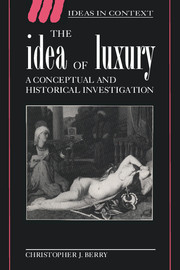8 - Luxury and the politics of needs and desires
Published online by Cambridge University Press: 01 June 2011
Summary
A guiding principle of this study is that the issue of luxury – its meaning and definition – is deeply implicated in the broadly political question of the nature of social order and the definition of a good society. In Parts ii and iii we examined how, at various periods in Western history, this implication manifested itself. In this concluding Part, I return to more ostensibly conceptual concerns and, in so doing, pick up a number of the points adumbrated in Part i.
These concerns deal, again, with the relationship between needs and desires and the location/definition of luxury in those terms. The object of this Part is to bring the political aspect more directly to the front of the discussion. More precisely, I wish to discuss the ways in which the operant definitions of luxury and need indicate a society's conception of itself, that is, what it values or thinks important, what it regards as ‘good and politic order’. The discussion in this chapter will focus on two topics – taxation and poverty – as two sides of the same coin. Taxation of consumption goods is a case where the definition of luxury is made socially explicit, when some goods are either exempted from or, conversely, specially selected for such a tax. Poverty is a case where it is the definition of need that is made socially explicit. It is necessary, however, to situate these topics within the more general conceptual picture.
- Type
- Chapter
- Information
- The Idea of LuxuryA Conceptual and Historical Investigation, pp. 199 - 230Publisher: Cambridge University PressPrint publication year: 1994

